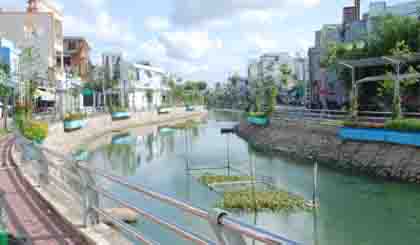Better infrastructure for 2.5 million urban residents in Vietnam
The urban upgrading project funded by the World Bank (WB) has improved the infrastructure in more than 200 low-income areas in the four cities of Hai Phong, Nam Dinh, Ho Chi Minh City and Can Tho over the past ten years, directly benefiting 2.5 million urban poor.
 |
| Ban canal in Can Tho was renovated under support from the WB. (Image credit: WB) |
The data was reported at a review conference held in Ho Chi Minh City on December 19 by the WB and the city’s People’s Committee.
Under the project, about 500km of drains and 580km of roads have been constructed or upgraded, helping reduce flooding, and improve the environmental conditions in poor neighbourhoods.
A total of 30,000 households have been connected to clean water supply and 550,000 had their drains connected to sewer systems. Narrow, dirty and flooded alleys are now paved, becoming wider, cleaner and safer. Nearly 30km of canals and ditches were dredged and connected to the drainage system.
Besides, nearly 100,000 loans were given for poor households in an attempt to help them improve housing condition and their livelihoods.
To execute the plan, the WB provided US$382 million, the Vietnamese Government invested US$140 million, and local people contributed US$30 million.9
(Source: nhandan.org.vn)
 về đầu trang
về đầu trang

